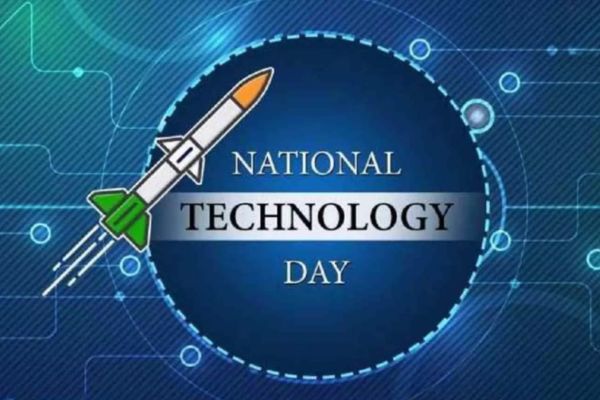On National Technology Day 2025, leaders across India’s academic, corporate, and innovation landscapes shared their reflections on the year’s theme: “Empowering Indian Youth for Global Leadership in Science & Innovation for Viksit Bharat.”
“On National Technology Day, we celebrate the spirit of innovation driving India toward a self-reliant and future-ready tomorrow. At Silicon Labs, we believe India’s youth hold the key to global leadership in science and technology. With the rise of smart cities and IoT-led solutions, young innovators have unprecedented opportunities to design sustainable, intelligent systems that solve real-world challenges. By nurturing STEM talent and fostering a culture of experimentation, we can empower them to build a Viksit Bharat—one that is digitally inclusive, globally competitive, and led by homegrown innovation.” Manish Kothari, Senior Vice President Silicon Labs
“The first step to guaranteeing that India’s youth can lead the world in science and technology is equipping them with skills that are fit for the future, and cybersecurity is a crucial component. Infrastructure and information protection are essential as India speeds up its digital transformation. We are dedicated to making young innovators cyber-resilient so they can lead securely and confidently on the global stage. India’s positioning in the global digital space is facilitated by a rich culture of cybersecurity, far beyond necessity.” Rajesh Chhabra, General Manager, India & South Asia, Acronis
“Today is a day to celebrate the remarkable achievements in technology. National Technology Day honors India’s accomplishments in science and technology. The theme for the year, ‘Empowering Indian Youth for Global Leadership in Science & Innovation for Viksit Bharat,’ emphasizes the vital role of young minds in shaping the future of India as a developed country. As students, you have the power to drive innovation and bring about positive change. Whether it’s AI, space exploration, sustainable development, or entrepreneurship, your ideas and efforts can make a lasting impact.” Dr. Suresh Ukarande Dean, Faculty of Engineering & Technology, Somaiya Vidyavihar University
“To achieve Viksit Bharat by 2047, Indian youth must be empowered to lead the science and innovation space with groundbreaking ideas—mere participation will not suffice. Innovations from India should move beyond addressing local challenges to contributing to global progress. This requires access to quality STEM education, especially in rural areas, along with the creation of strong mentorship ecosystems and reward systems that nurture talent. Innovation hubs must actively encourage youth participation and foster an innovative spirit and an ‘act local, think global’ mindset to drive meaningful, high-impact innovations.” Kumaresan Arunachalam, Associate Vice President, Avalon Consulting
“India, the nation of most young brains and visionary Next-Gen Technocrats, is all set to lead the world towards a SafeTech Ecosystem and TechnoWellness. This transformation from India to Viksit Bharat is only possible through empowering Indian youths with not just knowledge or global exposure but through the vision of building the nation with Digital Harmony. Their able mind and heart have the courage to solve complex social problems with mindfulness and an innovative approach with the power of science and technology.” Prof. Sudarshan Sirsat, Assistant Professor, Data Science and Technology, K J Somaiya Institute of Management
“Innovation must go beyond research labs—it should be nurtured in the classrooms through project-based learning and creative exploration. Instilling this mindset in youth sparks entrepreneurship and opens doors to global opportunities. This spirit of innovation fuels a self-reliant economy, laying the foundation for a developed nation. By empowering India’s youth in science and innovation, we pave the way for global leadership and take a decisive step toward a truly Viksit Bharat.” Dr. Krantee Jamdaade, Assistant Professor, Data Science and Technology, K J Somaiya Institute of Management
“National Technology Day 2025 celebrates India’s scientific and technological progress while paving the way to harness the collective potential of Indian youth for accelerating this advancement. The curiosity of young minds must be transformed into a quest for innovative solutions that extends beyond science, technology, engineering, and mathematics (STEM). The way forward is to equip youth with a problem-solving mindset and promote collaboration. Generative AI can accelerate innovation by providing new opportunities for data sourcing and analysis. What is needed is a startup ecosystem that empowers youth to experiment with science and technology, which can significantly contribute to realizing the dream of Viksit Bharat and developing future-ready Global Leaders.” Prof. Himanshu Joshi, Professor, Information Management, International Management Institute (IMI)
“Technology today acts as a great equalizer, redefining how we live, work, and connect. Yet, as AI rapidly transforms industries and the nature of work, it also highlights the stark skilling gap in India, especially among the youth. A report by Mercer-Mettl, reveals that only 42.6 per cent of Indian graduates are employable.
Many young individuals face systemic barriers to technology access and quality training. These barriers must be urgently addressed if we are to build an inclusive digital economy.
At AceCloud, we believe that inclusive innovation starts with inclusive learning. That’s why we empower every associate with self-paced access to over 10,000 Udemy courses in GenAI, cloud, cybersecurity, leadership, etc. Our AI-powered career platforms create tailored learning journeys for all our associates, ensuring no one is left behind in the AI revolution. We also aim to champion industry mentorship, hands-on exposure, and meaningful engagement with emerging talent to fuel long-term careers in STEM. On this National Technology Day, let’s celebrate not just the technology that is reshaping our future, but also the people driving it.” Dr. Sangeeta Chhabra is the Co-Founder & Executive Director of AceCloud (a brand of RTDS)
“On World Technology Day, we celebrate the boundless potential of innovation to transform industries and elevate human progress. At Xpedeon, our evolution from a traditional ERP provider to a global SaaS platform is rooted in a clear vision—to lead the next wave of digital transformation in the built environment. As the ConTech landscape rapidly advances, driven by AI, automation, and real-time data intelligence, we are committed to creating technologies that redefine how construction and engineering projects are designed, delivered, and scaled. The future of ConTech lies in intelligent, integrated systems that drive efficiency, sustainability, and agility, and we are proud to be at the forefront of that movement.” Janak Vakharia, CEO – Xpedeon
“Nation-building is in our DNA and on this National Technology Day, we are reminded that India’s true strength lies not just in its innovation, but in the spirit behind it. As Prime Minister Modi ji envisions a Viksit Bharat through ‘Make in India’, it’s up to us – entrepreneurs, technologists, and citizens – to turn that vision into reality. At B-Square, we believe India has the intelligence, heart, and determination to lead the world in transformative, future-ready technology. We don’t just want to scale businesses – we want to help shape a future where Indian innovation powers global progress and where technology uplifts every corner of our nation. This is our responsibility, and our greatest aspiration.” Payal Nambiar, Founder and Director, B-Square Solutions
“National Technology Day is a powerful reminder of India’s growing strength in innovation and self-reliance. At Akai India, we see this day as an opportunity to celebrate how technology can transform lives when it’s designed with purpose.
With a legacy of Japanese engineering and a strong ‘Make in India’ vision, we’re committed to creating solutions that reflect the evolving needs of Indian consumers, from energy-efficient air conditioners to intelligent displays and smart appliances. For us, technology isn’t just about advancement, it’s about relevance, reliability and improving everyday life.
On this day, we stand alongside the nation in driving progress through meaningful innovation, and we remain focused on building a brighter, smarter future for India.” Anurag Sharma, Managing Director & CEO, AKAI India
“National Technology Day is a celebration of India’s remarkable journey in leveraging innovation to build a more inclusive, empowered, and digitally connected nation. Our progress in developing digital public infrastructure—ranging from Aadhaar and UPI to Account Aggregators—has not only redefined access to essential services but also laid the foundation for scalable and sustainable innovation in financial services.
At axio, we believe technology should not only simplify but also personalize. We are harnessing the power of data science to build intelligent credit experiences tailored to the unique financial context of each individual. For us, innovation is a means to drive long-term impact—where credit is no longer one-size-fits-all, and digital finance systems are secure, transparent, and designed to serve real people in real-time.
We continue to envision a future where public infrastructure and personalized technology come together to unlock opportunity for every Indian, fostering a digitally resilient and sustainable future.” Patanjali Somayaji, Chief Technology Officer, axio
“Ensuring that tech is built to last is crucial for a circular economy and in providing a clean, green solution, across sectors. While the pace at which technology is evolving is much faster than innovation at times, with Agentic Flows, it is easier to train and retrain tech and data.
In 2025 and ahead, I see two main trends for innovation: One, building tech with purpose powered by Agentic Flows. Two, understanding improved investment in leveraging tech that aligns with a business goal. As engineering leaders, we are focused on using AI and data to drive sustainability not just as a compliance measure, but as a catalyst for innovation. As custodians of innovation, we must ask: Is what we build sustainable, ethical, and inclusive? This includes ensuring green software development, democratized access to data, AI and moving away from legacy tech to modern tech that reduces carbon footprint.” Saravanan T, Senior Director, Engineering Product Management, Ascendion
“National Technology Day is a powerful reminder of India’s scientific spirit and its capacity to lead change through innovation. The 2025 theme, ‘Empowering a Sustainable Tomorrow Through Innovation,’ resonates deeply with our work at Tata Elxsi, where we constantly strive to engineer solutions that are not just technologically advanced but also environmentally and socially responsible.
In today’s rapidly transforming world, sustainability is no longer a choice—it is a commitment we owe to future generations. Technology plays a vital role in driving this change, from electric and autonomous mobility systems to circular design, smart manufacturing, and energy-efficient digital platforms. In the automotive industry, sustainability is not just a trend—it is the road ahead. At Tata Elxsi, we are building integrated, human-centric transportation ecosystems powered by AI, simulation, and sustainable engineering principles. These innovations not only reduce carbon footprints but also elevate the quality of life and foster inclusive development.
Commemorating National Technology Day each year is more than a celebration—it’s an opportunity to reflect, realign, and recommit ourselves to using technology as a force for good. It is also a moment to honour the scientists, engineers, designers, and thinkers who are shaping a greener and more equitable future.
This day serves as a rallying call for all of us—industries, academia, policymakers, and young innovators—to collaborate across boundaries and co-create sustainable solutions. Let us continue to innovate with purpose and ensure that our technological progress lights the path to a cleaner, smarter, and more sustainable tomorrow.” Manoz Kr Tirupati, Global Head, Transportation Design & Engineering, Tata Elxsi
“Technology’s greatest promise has always been to elevate human potential. Yet, in today’s enterprise world, the tools designed to enhance productivity often create complexity and digital friction. This disconnect impacts not only efficiency but also employee engagement and organizational momentum, ultimately hindering the very progress technology intends to drive.
At Whatfix, we believe the solution lies in rethinking how technology is designed and delivered. Our approach centers on Userization, a principle that places the user at the heart of every digital experience. Instead of expecting people to adjust to systems, we build systems that adjust to people. The result is technology that is intuitive, contextual, and truly empowering.
As Artificial Intelligence (AI) becomes a cornerstone of innovation in India, its true value lies in simplifying complexity and enabling smarter workflows. However, non-technical challenges often hinder AI adoption, such as resistance to change, skill gaps, and uncertainty around integration into daily work.
This is where the human factor becomes critical. When users lack clarity or confidence, adoption falters. At Whatfix, we bridge this gap with our AI-powered digital adoption suite, led by ScreenSense, our proprietary engine that provides real-time, contextual guidance tailored to each user’s needs.
These innovations are driven from India, where our teams have been shaping the future of digital adoption since 2014. Today, Whatfix powers success for over 80 Fortune 500 companies worldwide, demonstrating the global impact of user-centric technology. As demand for digital expertise grows, so does the need to upskill professionals who can lead this transformation.
To meet this need, we launched Whatfix University, a learning platform focused on Digital Adoption Platforms and Product Analytics. Since 2021, we have empowered over 5,500 professionals with future-ready skills that directly contribute to digital transformation, maximize tool adoption, and drive real business value.
On this National Technology Day, we are reminded that real digital transformation does not come from adopting the newest tools but from making those tools work for people. It’s about empowering users, removing friction, and creating technology experiences that feel seamless and supportive.
At Whatfix, this is the kind of technology we build. This is what “tech for good” means to us.” Vara Kumar Namburu, Co-founder & Head of R&D and Solutions, Whatfix
“On National Technology Day, we reflect on how digital innovation is redefining healthcare delivery in India. At MediBuddy, we are proud to be shaping a future of healthcare in India in a manner where technology is not just an enabler but also a powerful equaliser—bridging the gap between urban and rural healthcare. Our efforts are centred on building an integrated digital health ecosystem that connects doctor consultations, medicine delivery, lab tests at home/phlebotomy services, and surgery care into one seamless experience across the entire journey of a patient. Through technologies like CLARA, our clinical AI engine, and QuAFI, our real-time quality feedback system, we are making care more precise, personalised, and proactive. These systems empower our doctors with actionable insights while enhancing patient satisfaction and clinical outcomes. We are also ensuring that our company is inclusive and accessible—available in over 16 languages and optimised for low-bandwidth areas. Technology alone doesn’t solve healthcare challenges—how we design and apply it does. At MediBuddy, every line of code, every AI model, and every digital touchpoint is built with a people-first mindset. On this day, we reaffirm our commitment to building scalable, inclusive, and human-centric healthcare solutions that are already impacting over 3 crore lives across India.” Enbasekar D, Co-founder & CTO, MediBuddy
“Innovation is not reserved for experienced professionals alone! An inquisitive mind of a student or a fresher can be just as innovative. An innovation need not be a paradigm shift—it can be a simple idea that makes life easier for someone or makes something more efficient. Great ideas can emerge at any time, from anyone, anywhere. It is the responsibility of schools and mentors to nurture these ideas, encouraging them to be explored and developed. A startup can serve as a launch pad where ideas are transformed into real-world products or services. Frugal innovation, in particular, offers a sustainable way to turn creative thinking into impactful outcomes. They also provide young people with a hands-on environment to learn the many dimensions of entrepreneurship. Involvement in early-stage ventures equips them with the skills and mindset to thrive—either as founders or as integral contributors to larger enterprises. Beginning the entrepreneurial journey early in one’s career can be highly advantageous. Young minds are often free from entrenched biases and possess a natural appetite for risk. To truly harness this potential, collaboration between industry and academia is essential—empowering the next generation to pursue entrepreneurship as a viable and impactful career path. India currently faces ecosystem gaps across nearly every industry. Startups and MSMEs are uniquely positioned to address these challenges. Young innovators should feel encouraged to step forward and take on this responsibility—knowing that both industry and academia stand ready to support their efforts.” Vijay Bolloju, Director for R&D, iVP Semiconductor
“India is emerging as a global leader in technology-driven workforce transformation, driven by national initiatives that upskill talent in AI, digital technologies, and automation. GCCs continue to lead in adopting and deploying AI and automation across industries like financial services, healthcare, manufacturing, and energy sectors. Automation Anywhere supports this momentum by offering accessible automation tools and comprehensive hands-on training programs. Automation Anywhere University has facilitated the completion of over 3.5 million courses globally, reflecting our commitment to equipping users with essential skills and knowledge in the field of automation. With the rise of Agentic Process Automation, we are entering a new era where digital agents autonomously initiate and execute complex business processes – reshaping how work is done. This enables organizations to scale efficiently while unlocking deeper human-machine collaboration. Our efforts align with India’s skilling missions, such as the Skill India Digital Hub and the IndiaAI initiative, contributing to a digitally empowered workforce. On this National Technology Day, we celebrate India’s commitment to inclusive, tech-led progress and reaffirm our dedication to supporting this journey through innovation and collaboration.” Dominic Pereira, VP, Product Management, Automation Anywhere
“Early exposure to an innovation-driven environment can transform how young minds approach problem-solving. Only when students are introduced to the possibilities of technology, their ideas grow into impactful solutions. For instance, a student exposed to coding early on might go from designing simple apps to building tools that address real-world challenges like climate change or healthcare inefficiencies. This early nurturing of creativity helps them see technology not as a mere tool but as a platform for positive change.
But how do we expect young people to become problem-solvers if we train them to avoid mistakes? True innovation thrives only when we are unafraid to take risks. It flourishes in freedom, in trial and error, and in the willingness to fail. They must learn that setbacks are stepping stones to success, and schools play a vital role in fostering this resilience and adaptability. Educational institutions, adapting to changing times, must shift from valuing perfect answers to rewarding bold and innovative solutions. They are essential in this process, acting like a laboratory where failure isn’t a dead-end, but part of the scientific process. This shift doesn’t take million-dollar labs or advanced tech. It requires giving students the space to care, to try, and develop a genuine curiosity for learning. Because real growth begins with failure, preparing them to embrace challenges and innovate fearlessly in the entrepreneurial world.” Noopur Julka, Senior Director, UST

















